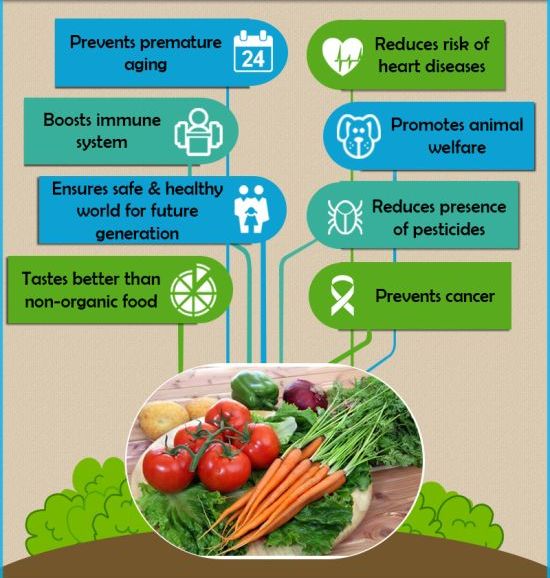Benefits of Eating Organic
Eating organic has become increasingly popular in recent years, as people are becoming more conscious about their health and the environment. In this article, we will explore the numerous benefits of consuming organic food and highlight why it is a great choice for your overall well-being.
Improved Nutritional Value
Organic food is known to have higher nutritional value compared to conventionally grown produce. Research suggests that organic fruits and vegetables contain more vitamins, minerals, and antioxidants, which are essential for maintaining good health. By choosing organic, you can ensure that you are getting the maximum nutritional benefits from your food.
Reduced Exposure to Pesticides
One of the primary reasons people opt for organic food is to reduce their exposure to harmful pesticides. Conventionally grown crops are often treated with synthetic pesticides, which can leave residues on the produce. These residues have been linked to various health issues, including cancer and hormone disruption. Organic farming practices, on the other hand, rely on natural methods to control pests, minimizing the use of pesticides and reducing your exposure to harmful chemicals.
Supports Environmental Conservation
Organic farming practices prioritize the preservation of the environment. These methods promote sustainable agriculture by avoiding the use of chemical fertilizers and pesticides that can pollute soil, water, and air. Organic farming also promotes biodiversity by preserving natural habitats and supporting the growth of beneficial insects and wildlife. By choosing organic, you are contributing to the conservation of our planet.
Enhanced Taste
Many people find that organic food has a superior taste compared to conventionally grown produce. This can be attributed to the natural and traditional farming methods used in organic agriculture. Organic crops are often grown in nutrient-rich soil, which enhances the flavor of the produce. Additionally, organic livestock is typically raised on a natural diet, resulting in meat and dairy products that are more flavorful.
Free from Genetically Modified Organisms (GMOs)
Genetically modified organisms (GMOs) are plants or animals that have been genetically engineered to possess specific traits. While GMOs are widely used in conventional agriculture, organic food is produced without the use of GMOs. By choosing organic, you can avoid consuming genetically modified ingredients and have peace of mind knowing that your food is free from artificial modifications.
Supports Local Farmers
Choosing organic food supports local farmers who follow sustainable farming practices. Organic farming often takes place on smaller-scale farms, which helps to preserve traditional farming methods and maintain a connection to the local community. By purchasing organic produce, you are directly contributing to the livelihood of these farmers and promoting a more sustainable food system.

Eating organic offers a wide range of benefits for your health, the environment, and local communities. With its higher nutritional value, reduced pesticide exposure, and support for sustainable farming practices, organic food provides a holistic approach to nourishing your body and protecting the planet. By choosing to consume organic, you are taking a step towards a healthier and more sustainable future.
Frequently Asked Questions
1. What are the benefits of eating organic?
Eating organic food has several benefits, including:
Reduced exposure to pesticides and chemicals
Higher nutrient content
Supporting sustainable farming practices
Better taste and flavor
Preserving biodiversity
2. Is organic food more nutritious?
Yes, organic food tends to have higher nutrient content compared to conventionally grown food. This is because organic farming practices focus on soil health and natural fertilizers, resulting in more nutrient-rich produce.
3. Does eating organic reduce exposure to pesticides?
Absolutely! Organic food is grown without the use of synthetic pesticides, so consuming organic products reduces your exposure to harmful chemicals commonly found in conventionally grown food.
4. How does organic farming support sustainable practices?
Organic farming methods prioritize soil health, water conservation, and biodiversity. By avoiding synthetic chemicals and genetically modified organisms (GMOs), organic farmers help protect the environment and promote sustainable agricultural practices.
5. Does organic food taste better?
Many people find that organic food has a more natural and flavorful taste compared to conventionally grown food. This is because organic farming practices focus on enhancing the quality of soil, which in turn enhances the taste of the produce.
6. Are organic products more expensive?
Organic products can be slightly more expensive due to the higher costs associated with organic farming practices. However, the long-term health benefits and environmental advantages make it a worthwhile investment for many individuals.
7. Does eating organic help preserve biodiversity?
Yes, organic farming promotes biodiversity by avoiding the use of synthetic pesticides and genetically modified crops. This helps maintain a healthier ecosystem, preserving the diversity of plants, animals, and microorganisms.
8. Can organic food help reduce the risk of certain diseases?
While more research is needed, some studies suggest that consuming organic food may reduce the risk of certain diseases. Organic food is generally free from synthetic chemicals, which may have harmful effects on human health when consumed in large quantities.
9. Is organic food better for the environment?
Yes, organic farming practices have a lower impact on the environment compared to conventional farming. By avoiding synthetic pesticides and promoting sustainable practices, organic farming helps protect soil quality, conserve water, and reduce pollution.
10. Are all organic products labeled as “certified organic”?
No, not all organic products are labeled as “certified organic.” However, reputable organic products often carry a certification label from recognized organizations that verify their adherence to organic farming standards.




